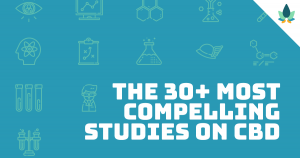Cannabidiol (CBD) oil has quickly risen in popularity as an alternative medicine for a wide variety of ailments.
Unfortunately, there is a lot of misinformation out there on this relatively new drug.
To help you sort out right from wrong, we’ve compiled the 20 most compelling studies on CBD—ranging from the benefits of CBD to the potential side effects it may have.
But why trust us? Most of the information out there on CBD is written by companies trying to sell you something, for scientific journals, or by trendy sites only interested in this week’s buzzword. Our goal is to provide the most accurate information about CBD and do all the research so you don’t have to. Read more here.
Now then, let’s dive in!
What We Know About CBD So Far
A recent overview of CBD studies done on February 7th, 2019 took a look at everything we know about CBD studies so far—good and bad—to see what’s known versus what needs more research. (1)
They found that:
“On the Internet, CBD has been touted for many ailments for which it has not been studied, and in those diseases with evaluable human data, it generally has weak or very weak evidence. The control of refractory seizures is a clear exception, with strong evidence of CBD’s benefit. Acute CBD dosing before anxiety‐provoking events like public speaking and the chronic use of CBD in schizophrenia are promising but not proven. CBD is not risk-free, with adverse events (primarily somnolence and gastrointestinal in nature) and drug interactions. CBD has been shown to increase liver function tests and needs further study to assess its impact on suicidal ideation.”
In other words, CBD has definite evidence in the control of refractory seizures where other medicines have proven ineffective, such as certain forms of epilepsy (which we’ll cover more deeply in another section below).
Some other things that are promising but need further testing:
- Small doses of CBD can help lower anxiety
- Long-term CBD use may combat schizophrenia
- Using CBD to treat pain/spasticity and Parkinson disease
Finally, the overview looked at the side effects of CBD. Previously, it was thought that CBD side effects were virtually non-existent, but new research shows that CBD may cause drowsiness and/or IBS (Irritable Bowel Syndrome; stomach aches).
Further backing up these findings is a 2018 study, which found that:
“CBD was shown to have anxiolytic, antipsychotic, and neuroprotective properties. In addition, basic and clinical investigations on the effects of CBD have been carried out in the context of many other health conditions, including its potential use in epilepsy, substance abuse and dependence, schizophrenia, social phobia, post-traumatic stress, depression, bipolar disorder, sleep disorders, and Parkinson.” (2)
We’re going to cover studies from most of the benefits mentioned here throughout this article.
CBD Studies on Epilepsy
First up, we have studies on CBD’s effectiveness for epilepsy, since these are the most promising results.
This is particularly important because on June 25th, 2018, the FDA approved “the first drug comprised of an active ingredient derived from marijuana (AKA CBD) to treat rare, severe forms of epilepsy.” (3)
Meaning, they could more thoroughly test CBD on epilepsy cases.
Before that, though, a 2014 study titled Cannabidiol: Pharmacology and potential therapeutic role in epilepsy and other neuropsychiatric disorders, found that while THC is “anticonvulsant in most animal models but can be proconvulsant in some healthy animals”, CBD is “anticonvulsant in many acute animal models.”
In plain English: THC may prevent seizures in some cases, but cause them in others. CBD, on the other hand, did not cause seizures in any test but did prevent them.
Of course, further testing was required. A newer study was done in March 2018 and found that “consistent with other studies, our retrospective study suggests that artisanal CBD is helpful in the treatment of medically refractory epilepsy with benefits that cannot be credited to interaction with clobazam and increased levels of its active metabolite. These data add additional support for the use of artisanal CBD in the treatment of drug-resistant epilepsy as in our patient population. As has recently been reported, outside of seizure control, CBD use was also associated with increased alertness, improved verbal communication, better social interactions, and better mood, suggesting additional benefits to use CBD.”
In short, there is a lot of very strong evidence that CBD can severely decrease epileptic seizures.
Studies on CBD And Epilepsy
CBD Studies on Chronic Pain Relief
Another touted benefit of CBD is its anti-inflammatory and pain relief effects.
There have been a significant number of tests done on this, with some of the earlier evidence showing up in a 2012 study. Researchers found that cannabinoids suppress inflammatory and “neuropathic” pain (chronic pain potentially caused by damage to your sensory cells) in rats.
Following that, a 2017 study found that CBD can have an effect on the “perception” of pain, meaning that even though animal subjects might technically be experiencing pain, they aren’t perceiving the sensation. A difficult thing to comprehend!
A 2017 study on human subjects found that CBD could potentially replace opioid-based pain medication. This was a long-term Patient Self-Report, meaning the study’s participants reported their findings to the researchers themselves rather than staying in a lab. As such, researchers concluded that further study is needed.
Studies on CBD And Pain
CBD Studies On Liver Damage
The next claim we’re tackling is CBD’s effects on liver damage.
A 2017 study looked at “the effects of CBD on liver injury induced by chronic plus binge alcohol feeding in mice.” It found that “CBD may have therapeutic potential in the treatment of alcoholic liver diseases associated with inflammation, oxidative stress, and steatosis.”
In plain English: CBD might be able to treat alcoholism-related liver damage, but human testing is needed to find out.
Studies on CBD And Liver Damage
CBD Studies on Cancer
Cancer is a big disease, the one everyone’s trying to solve. Is CBD the cure?
An overview study published in 2018 looks at 10 studies of CBD’s effects on cancer, and here’s what they found:
“The majority of the facts regarding the interactions with CBD were found using in vitro studies and the true in vivo implications are not well-known. Minimal data were available regarding the interactions between CBD and anticancer agents. However, pharmacists should always consider the possibility of interactions and their consequences whenever they are aware of a patient using CBD products.”
In plain English: CBD has not been proven to fight cancer, and the evidence of such is minimal. But they encourage pharmacists to understand the drug-to-drug interactions of CBD with other drugs commonly administered to people with cancer.
Studies on CBD And Cancer
CBD Studies on Reducing Blood Pressure
A 2017 study gave nine “healthy” male volunteers a single 600 mg dose of CBD (or a placebo) in a “randomized, placebo-controlled, double-blind, crossover study.”
They found that this single-dose “reduced blood pressure in healthy volunteers” by –6 mmHg, on average. Of course, this is only in nine men—not exactly a great sample of the entire human population.
Unfortunately, further testing is required.
Studies on CBD And Blood Pressure
CBD Studies on Strokes
Besides epileptic seizures, strokes are another hot topic around CBD uses.
This study from 2017 found that “CBD can reduce brain damage and improve recovery after a stroke” in rats. Human testing is required, but the results are promising.
Studies on CBD And Strokes
CBD Studies on PTSD
PTSD is a big problem, especially among US veterans.
This 2017 study (also on rats) found that cannabidiol “disrupts the consolidation of specific and generalized fear memories”, but has no effect on short-term fear memories.
In plain English: CBD may keep your terrifying memories from ganging up on you. Human testing is needed.
Studies on CBD And PTSD
CBD Studies on Anxiety
Similar to PTSD, anxiety is another common ailment among US citizens.
A study overview from 2015 found that “existing preclinical evidence strongly supports CBD as a treatment for generalized anxiety disorder, panic disorder, social anxiety disorder, obsessive-compulsive disorder, and post-traumatic stress disorder when administered acutely; however, few studies have investigated chronic CBD dosing.” The same study also found that “evidence from human studies supports an anxiolytic role of CBD, but is currently limited to acute dosing, also with few studies in clinical populations.”
Studies On CBD And Anxiety
CBD Studies on Schizophrenia
Schizophrenia is a terrible ailment that causes people to essentially lose touch with reality.
A study from 2018 looked at 85 stable medicated patients with schizophrenia (61% men; age = 41.6 ± 12.2 years; illness duration = 12.8 ± 10.7 years). Here are the results:
“We did not find any differences in general cognitive performance (BACS total score) regarding the three polymorphisms tested. However, when we analyzed specific cognitive domains we have found a significant difference (p=0.002) regarding working memory (assessed by the Digit Span test) in patients with the rs12720071 polymorphism, where those with allele C performed better than those with T/T genotype.”
In plain English: CBD did not improve patients with schizophrenia, but it did improve their working memory, meaning they were able to better perform short-term tasks like math or short-term communication.
Studies on CBD And Schizophrenia
CBD Studies on Addiction
Most methods of treating addiction have incredible high failure rates. This is in large part due to the patient’s environment, but some studies looked at CBDs’ effects on cravings and addictions in the same environment.
For example, a 2013 study found that cannabidiol reduces cigarette consumption in tobacco smokers. However, these were only preliminary findings, meaning more research is needed.
A separate 2018 study looked at the addictiveness of CBD itself and found that there is virtually no risk of dependency forming in CBD users.
Studies on CBD And Addiction
CBD Studies on Type 1 Diabetes
Diabetes is another epidemic plaguing the United States, with over 30.3 million reported cases. (4)
Naturally, researchers looked at the effects of CBD on Diabetes. A 2016 experimental cannabidiol treatment reduced early pancreatic inflammation in type 1 diabetes in mice.
Another study from 2018 looked at middle-aged rats and found that “repeated CBD treatment decreased body weight” as well as “improved memory performance and reduced hippocampal levels of inflammation markers” (AKA inflammation in the brain).
Studies on CBD And Type 1 Diabetes
Other Compelling Studies on CBD
Conclusion
Overview, CBD has a plethora of benefits, but some are overstated and others are only proven on mice. The big benefits of CBD seem to be reducing epileptic seizures, helping reduce chronic pain, improving short-term working memory, and repairing liver damage.
The big issue with current studies is that most of them are either only done on mice or only look at a very small population sample. Further testing is definitely needed.
Which of these were most interesting to you? Do you know of any other compelling studies on CBD? Let us know in the comments below!







